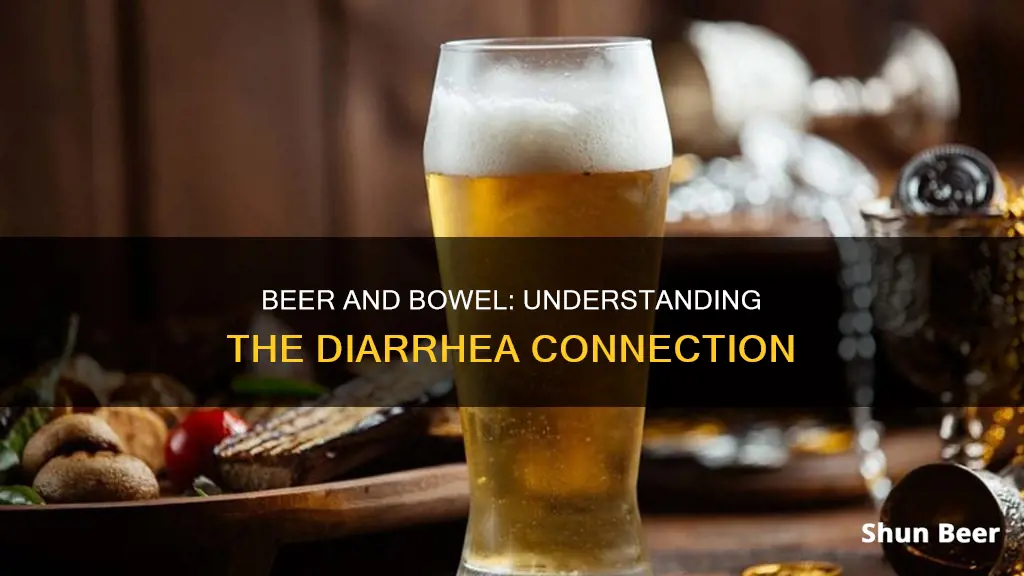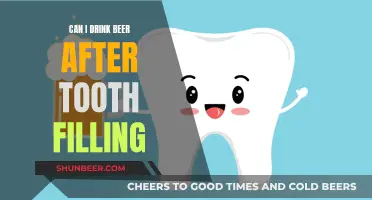
Drinking too much beer can cause diarrhea. Alcohol is a direct irritant to the gut, and drinking alcohol is akin to applying rubbing alcohol to your skin. Consuming large volumes of alcohol can cause watery stools as a result of irritation. Ethanol, a common ingredient in many alcoholic beverages, irritates the gut and increases intestinal motility, causing the stomach to empty more quickly. Beer, in particular, is a high-carb drink, and when these carbs reach the large intestine without breaking down, bacteria start to convert them into energy, resulting in gas, bloating, and diarrhea.
| Characteristics | Values |
|---|---|
| Reason | Drinking too much beer can cause diarrhea due to the excess fluid in the gut, faster contractions inside the colon, and the irritation it causes to the gut. |
| Risk Factors | People with underlying gastrointestinal conditions such as Chron's disease, irritable bowel syndrome, and celiac disease are at a higher risk of experiencing diarrhea after drinking beer. |
| Prevention | To prevent diarrhea, it is recommended to eat and hydrate before drinking beer, avoid certain foods such as spicy and highly seasoned foods, and drink in moderation. |
| Treatment | To treat diarrhea after drinking beer, it is recommended to stop drinking alcohol, avoid irritating foods, take anti-diarrheal medication, and drink plenty of water and electrolytes. |
What You'll Learn
- Alcohol can irritate the gut, causing watery stools
- Ethanol in alcoholic drinks can increase intestinal motility, speeding up digestion
- Drinking can cause inflammation in the GI tract, leading to more frequent bowel movements
- Alcohol can alter the gut microbiome, leading to an imbalance of bacteria
- Beer and wine pose a higher risk of causing diarrhea than hard liquors

Alcohol can irritate the gut, causing watery stools
Alcohol is a direct irritant to the gut, and drinking it is akin to applying rubbing alcohol to your skin. Consuming large volumes of alcohol can cause watery stools as a result of this irritation.
Alcohol can also increase intestinal motility, causing the stomach to empty more quickly. This speedy digestion means your colon has less time to absorb water, resulting in diarrhea.
Drinking alcohol can also lead to a faster heart rate, which can manifest as heart palpitations and even chest pain.
Additionally, ethanol, a common ingredient in many alcoholic beverages, can disrupt the gut microbiome, predisposing the gut to dysbiosis, an imbalance between harmful and helpful bacteria. In cases of sustained alcohol use, this imbalance can lead to chronic diarrhea.
Drinking alcohol can also wreak havoc on the stomach lining and impact the liver and pancreas, all of which can cause prolonged bouts of diarrhea.
Beverages with lower alcohol concentrations, like beer, speed up GI tract activity, increasing the chances of diarrhea and other stomach issues. They also increase gastric acid production, which can irritate the stomach.
If you're experiencing diarrhea after drinking alcohol, it's important to stay hydrated and eat simple, bland foods. If symptoms persist or worsen, consult a healthcare professional.
Light Beer and Liver Damage: How Much is Too Much?
You may want to see also

Ethanol in alcoholic drinks can increase intestinal motility, speeding up digestion
Ethanol, a common ingredient in both alcoholic drinks and rubbing alcohol, can have a negative impact on the gut. Ethanol can irritate the gut and increase intestinal motility, causing the stomach to empty more quickly. This is because ethanol can speed up digestion, giving the colon less time to absorb water, resulting in diarrhoea.
Ethanol can also disrupt the gut microbiome, causing an imbalance between harmful and helpful bacteria. This can lead to dysbiosis, which is an imbalance in the gut microbiome that can cause digestive issues. Ethanol can also damage the stomach lining and impact the liver and pancreas, all of which can contribute to prolonged diarrhoea.
In addition to the effects of ethanol, other factors can also increase the likelihood of diarrhoea after drinking beer. Beer is a high-carb drink, and when these carbs reach the large intestine, they can be partially broken down by gut bacteria, resulting in gas, bloating, and diarrhoea. Sugary cocktails and other sugary drinks can have a similar effect.
The risk of diarrhoea also increases with the amount of alcohol consumed. Binge drinking can severely damage the digestive tract, leading to frequent diarrhoea. Additionally, drinking too much and too often can damage the stomach's protective lining, potentially leading to "leaky gut syndrome", which is characterised by diarrhoea, chest pain, gas, discomfort, and abdominal bloating.
To reduce the risk of diarrhoea after drinking beer, it is recommended to eat a well-balanced meal with fibre before and while drinking. Drinking in moderation is also important, as excessive alcohol consumption can have negative effects on the digestive system. Staying hydrated by drinking plenty of water or other fluids is crucial to counteract the dehydrating effects of alcohol.
Beer and Typhoid: A Dangerous Mix?
You may want to see also

Drinking can cause inflammation in the GI tract, leading to more frequent bowel movements
Drinking alcohol can have a significant impact on gut health. Alcohol is ingested and transported through the gastrointestinal (GI) tract, and it can cause inflammation in the GI tract, leading to more frequent bowel movements.
The more alcohol you consume, the more your GI tract will come into contact with it. The GI tract metabolises alcohol by breaking it down into acetaldehyde, a toxin that is known to damage gut cells and cause chronic inflammation. While inflammation itself does not cause diarrhoea, it does lead to the malfunctioning of the sodium pump in the gut. This increased secretion of water and sodium into the gut then causes diarrhoea.
Drinking alcohol can also cause the muscles around the large intestine to contract more frequently and push waste through at a faster rate. This can result in the large intestine not having enough time to absorb water, leading to diarrhoea.
Alcohol can also affect the gut in other ways, such as by disrupting the gut microbiome and damaging the stomach lining. This can lead to digestive issues in the long run.
Additionally, drinks with lower ethanol content, such as beer and wine, tend to increase gastric acid secretion, which can further irritate the gut and exacerbate inflammation and diarrhoea.
If you are experiencing diarrhoea after drinking alcohol, it is important to stay hydrated and drink plenty of water or other fluids. It is also recommended to eat bland, easily digestible foods such as bananas, crackers, and toast. If symptoms persist or worsen, it is important to consult a healthcare professional.
Beer and Acne: Is There a Connection?
You may want to see also

Alcohol can alter the gut microbiome, leading to an imbalance of bacteria
Drinking too much beer can cause diarrhea, and this is related to the effect of alcohol on the gut microbiome. Alcohol can alter the gut microbiome, leading to an imbalance of bacteria, a condition known as dysbiosis. This imbalance can result in digestive issues, including chronic diarrhea.
The gut microbiome refers to the community of microorganisms, primarily bacteria, that inhabit the intestines. These bacteria play a crucial role in maintaining digestive health and supporting various physiological processes. However, alcohol consumption can disrupt the delicate balance of these beneficial bacteria, leading to an overgrowth of "bad" bacteria and a decrease in "good" bacteria.
When alcohol enters the large intestine, it can cause the contractions of the gut to speed up, reducing the time available for water absorption. This excess water in the large intestine can lead to diarrhea. Additionally, alcohol is metabolized in the gut, and this process produces acetaldehyde, a toxin that can damage gut cells and cause chronic inflammation. While inflammation itself doesn't cause diarrhea, it leads to the malfunction of the sodium pump in the gut, resulting in increased water and sodium secretion into the gut, contributing to diarrhea.
Furthermore, alcoholic beverages with lower ethanol content, such as beer and wine, tend to increase gastric acid secretion, which exacerbates inflammation and diarrhea. Beer, being a high-carb drink, can also cause digestive issues as some of the carbohydrates reach the large intestine without being completely broken down. The bacteria in the large intestine then convert these carbs into energy, leading to gas, bloating, and diarrhea.
The link between alcohol consumption and gut microbiome imbalances can have long-term effects on digestive health. Prolonged alcohol use can impair the absorption of nutrients, disrupt the normal contractions of the gut, and promote the overgrowth of harmful bacteria. This can result in chronic diarrhea and other gastrointestinal issues.
To restore gut health and alleviate diarrhea, reducing alcohol consumption or abstaining from alcohol is crucial. Additionally, incorporating prebiotic and probiotic foods, such as garlic, onions, yogurt, and kefir, can help replenish and maintain a healthy balance of gut bacteria.
The Science of Nostalgia: Beer Cooler Edition
You may want to see also

Beer and wine pose a higher risk of causing diarrhea than hard liquors
Alcohol can affect the way your body digests food and can cause diarrhea. While any type and amount of alcohol can lead to diarrhea, beer and wine pose a higher risk than hard liquors.
The Role of Alcohol in Diarrhea
Alcohol can irritate the intestinal tract and speed up digestion. As the muscles in the colon contract more frequently, they push stool out faster, which may lead to diarrhea. Additionally, alcohol can cause inflammation in the gastrointestinal tract, leading to further irritation. This irritation can also affect water absorption, resulting in liquid stools and dehydration.
Beer and Wine vs. Hard Liquors
Beer and wine have a higher risk of causing diarrhea than hard liquors due to their lower alcohol content. Drinks with lower ethanol content tend to increase gastric acid secretion, which exacerbates inflammation and diarrhea. Beer, in particular, contains more carbohydrates than other forms of alcohol, and the body may struggle to break down these extra carbs while processing alcohol. Wine may cause diarrhea due to tannin sensitivity or allergies. Tannins are compounds found in grape skins, and a reaction can lead to diarrhea, along with headaches and nausea.
Preventing and Treating Alcohol-Induced Diarrhea
To prevent diarrhea, it is recommended to drink slowly, consume non-alcoholic drinks between alcoholic beverages, and eat before drinking to slow alcohol absorption. Replenishing fluids and electrolytes is crucial to counteracting dehydration caused by diarrhea. Water, broth, coconut water, and sports drinks can help restore fluid balance. Additionally, certain foods like cucumbers, watermelon, and oranges provide hydration and essential nutrients.
If diarrhea occurs, it typically resolves within a few days of at-home care. Anti-diarrheal medications, such as loperamide (Imodium), can help slow or stop diarrhea. However, if diarrhea persists or is accompanied by other symptoms, it is important to consult a healthcare professional.
Beer and Sore Throats: Is There a Link?
You may want to see also
Frequently asked questions
Beer is a high-carb drink, and when it reaches the large intestine, it can be broken down into carbs and sugars that the gut bacteria convert into energy, resulting in gas, bloating, and diarrhea.
Diarrhea typically lasts for as long as the alcohol is in your system, which can be a few hours, but it can sometimes last longer, especially if you drink heavily and regularly.
To reduce the risk of getting diarrhea, it is recommended to eat and hydrate before drinking beer. It is also important to drink in moderation, as one episode of moderate social drinking is unlikely to cause major stomach issues.
If diarrhea persists for more than a few days after drinking beer, it is recommended to consult a doctor or gastroenterologist to evaluate the cause.







